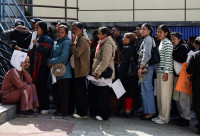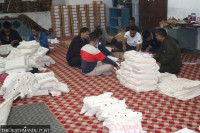National
Underpaid Pokhara nurses and low-paying hospitals dig in as standoff drags on
Now earning Rs15000-20000 a month, Manipal and GMC nurses demand Rs40,000. Manipali nurses reject new Rs24,000-29,000 offer.
Anup Paudel
A major dispute over wages between nurses and private hospitals in Pokhara has entered its second week, crippling key medical services and sparking a nationwide debate over labour rights in the country's health sector.
Nurses at Manipal Teaching Hospital in Phulbari have been on strike since October 10, while their counterparts at Gandaki Medical College (GMC) joined the protest two days later. Over the weekend, nurses from Charak Memorial Hospital in Nagdhunga also walked out, expanding the protest that has pitted health workers against private hospital owners.
The nurses, supported by the Nursing Association of Nepal, are demanding that private hospitals pay salaries equivalent to those of government nurses, as mandated by a recent government circular. But private hospital operators, represented by the Association of Private Health Institutions of Nepal (APHIN), insist that such pay parity is financially impossible.
Despite 10 days of demonstrations, talks have yet to make progress. “We haven’t had a single formal meeting with hospital management. The hospitals are offering us wages comparable to unskilled workers. How can that be acceptable for professionals who studied, trained, passed exams, and are qualified to work anywhere in the world?” said Muna Silwal, president of the Kaski chapter of the Nursing Association of Nepal.
According to Silwal, nurses at Manipal and GMC currently earn between Rs15,000 and Rs20,000 a month—barely above the government’s minimum wage for unskilled labour. “The system is exploitative,” she said. “We are asking for around Rs40,000, equivalent to fifth-level government nurses, nothing more.”
Manipal employs about 350 nurses while GMC has around 300. Following the protests, both hospitals discharged some patients and referred others to different facilities, citing safety concerns. These two institutions are also the only private hospitals in Pokhara enrolled in the government’s Health Insurance Programme, making them critical for low-income and insured patients.
Although outpatient departments (OPDs) remain open, new admissions have been suspended. The pressure has shifted to the Western Regional Hospital under the Pokhara Academy of Health Sciences, which has seen a sharp rise in patient load. “If services at Manipal and GMC don’t resume soon, insured patients will suffer the most,” said a senior official at the Provincial Health Directorate.
Hospital managements argue that the government cannot dictate wages in private institutions. “Under the Labour Act, we are only required to pay above the minimum wage,” said Narayan Paudel, a director at Manipal Medical College. “We have invested heavily and operate under financial risk. The government can’t impose public-sector pay scales on private hospitals.”
Manipal has proposed a four-tier salary structure based on qualifications and experience. As per the proposal, a bachelor’s degree nurse with at least one year of experience receives Rs29,587 per month while a PCL nurse with one year of experience receives Rs28,587. Similarly, CMA/ANM nurses with one year of experience are paid Rs26,587 each. Newly recruited nurses are paid Rs24,287.
The nurses rejected the offer, calling it “disrespectful and insufficient.” They are demanding around Rs40,000 as per the government's scale. “We were offered an increment of only a few thousand rupees, but that doesn’t address our demand for dignity,” said one protesting nurse at GMC.
Kapil Pokharel, Gandaki Province chair of the private hospital guild, APHIN, admitted that negotiations at Manipal had failed to reach a deal. “We are ready to improve facilities, but paying government-level salaries is beyond our capacity,” he said.
The protests have left an estimated 1,200 patients who depend on Manipal and GMC for daily services in limbo. While wealthier patients can seek care at private facilities, the disruption has hit those relying on the Health Insurance Programme the hardest.
Private hospitals in Nepal say they have long relied on low-paid nurses to keep operational costs down. Various investigation reports into private hospitals show that wages of many nurses are less than that of drivers or technicians in the same institutions, despite working longer shifts and facing higher occupational risks.
In response to mounting pressure, the government on Sunday formed a 14-member committee under Health Ministry Additional Secretary Dr Shree Krishna Shrestha to address the nurses’ demands. The committee includes representatives from the ministries of Health, Home, Finance, Labour, and Education, as well as the Nepal Nursing Council, the Nursing Association, the Nepal Medical and Dental College Association, APHIN, and protesting nurses. The committee has been tasked with recommending immediate and long-term measures to resolve the dispute.
As hospitals in Pokhara scramble to adjust and nurses stand firm on their demand, both sides show no signs of backing down. “We don’t want to stop treating patients. But our demand is simple—pay us what we deserve,” said one of the protesters at Manipal.




 20.9°C Kathmandu
20.9°C Kathmandu














